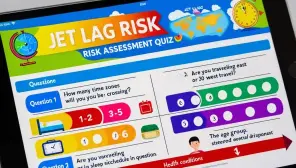Ever felt completely out of whack after a long flight? That groggy, disoriented feeling is jet lag, and it can seriously dampen your vacation vibes. But don’t worry! Jet lag doesn’t have to ruin your trip. With a little planning and these simple strategies, you can significantly reduce its effects and arrive at your destination feeling refreshed and ready to explore.
What is Jet Lag, Anyway? 🤔

Jet lag happens because your body’s internal clock, known as your circadian rhythm, gets thrown off when you travel across multiple time zones. This clock regulates your sleep-wake cycle, hormone release, and other bodily functions. When you suddenly shift time zones, your body struggles to adjust to the new schedule, leading to symptoms like:
- Sleep problems: Difficulty falling asleep, waking up frequently, or feeling tired even after sleeping.
- Fatigue: Feeling constantly exhausted and sluggish.
- Digestive issues: Upset stomach, constipation, or diarrhea.
- Headaches: A common side effect of sleep disruption.
- Mood changes: Irritability, anxiety, or difficulty concentrating.
Note: Even domestic flights that cross multiple time zones (like coast-to-coast U.S. flights) can cause mild jet lag, particularly if the time difference is three hours or more. So, these strategies aren’t just for long-haul international flights – they can help with shorter journeys too!
Preparing with Jet Lag Remedies: Setting the Stage for Success ✈️

The key to avoiding jet lag is to start preparing before you even step on the plane. Think of it like training for a marathon – you wouldn’t just show up on race day without any preparation, right?
1. Gradual Time Zone Adjustment
If your trip involves a significant time difference, try to adjust your sleep schedule gradually in the days leading up to your departure. For example, if you’re traveling east (where the sun rises earlier), go to bed a bit earlier each night and wake up a bit earlier each morning. The reverse is true for westward travel.
2. Optimize Your Sleep
Getting enough sleep before a long journey is crucial. Aim for 7-8 hours of quality sleep each night in the week before your flight. A well-rested body is better equipped to handle the stress of travel and time zone changes.
3. Hydrate, Hydrate, Hydrate! 💦
Dehydration can worsen jet lag symptoms. Start drinking plenty of water days before your flight, and continue to stay hydrated throughout your journey. Avoid excessive alcohol and caffeine, as they can dehydrate you and disrupt your sleep.
4. Light Exposure Matters! ☀️
Light plays a big role in regulating your circadian rhythm. In the days before your trip, try to get plenty of sunlight exposure in the morning. This helps to “reset” your body clock. Conversely, limit your exposure to bright light in the evening. If you’re traveling east, seek morning light; if west, try to get evening light.
Jet Lag Remedies During Your Flight: Making the Most of Your Time 😴

Even on a long flight, you can take steps to minimize jet lag.
Strategic Seating
If possible, choose a window seat for more privacy and a better chance at uninterrupted rest.
Sleep Aids
Consider using a sleep mask, earplugs, or even melatonin (after consulting your doctor) to help you sleep on the plane. Avoid sleeping pills unless prescribed by your doctor.
Stay Active
Get up and walk around the cabin every few hours to improve circulation and prevent stiffness. Simple stretches can also help.
Avoid New Foods
Choose healthy, light meals and snacks on the plane to avoid digestive upset.
Jet Lag Remedies After Landing: Gentle Resetting Tips 🌅

Once you arrive at your destination, try these tips to help your body adjust quickly:
Embrace the Local Time
Resist the urge to nap excessively. Instead, try to stay awake until your normal bedtime in the new time zone.
Sunlight Exposure
Get some sunlight exposure in the morning to help synchronize your circadian rhythm with the new time zone.
Gentle Exercise
Light physical activity, like a walk, can help regulate your body clock.
Stay Hydrated
Continue to drink plenty of water.
Personal Anecdote: My Jet Lag Woes (and Triumphs!) 🧳
I once traveled from New York to Tokyo – a 14-hour flight and a 13-hour time difference! I completely neglected the advice above and paid the price. The first few days were a blur of exhaustion and confusion. On my next long-haul trip, I meticulously followed the tips, and the difference was night and day! I experienced far less fatigue and adjusted much faster.
With these tips in mind, your next trip could be as smooth as mine
Apps and Tools for Jet Lag Remedies📱

Several apps can help you plan your trip to minimize jet lag. These apps often provide personalized recommendations based on your flight details and destination. They suggest when to adjust your sleep schedule, when to get sunlight exposure, and even when to take melatonin.
- Timeshifter: Personalized jet lag plans based on your flight details, sleep patterns, and whether you’re a morning or night person. The app even includes caffeine guidance, making it super practical for planning.
- Jet Lag Rooster: Simple and user-friendly, this app offers detailed instructions on light exposure and sleep timing to help you sync with your destination.
- Entrain: Based on research from the University of Michigan, it uses algorithms to help sync your circadian rhythm with your destination’s time zone.
Additional Jet Lag Remedies for a Smooth Transition

Age-Specific Considerations 👵👶
Jet Lag Remedies for Older Adults
As we age, our bodies may take longer to adjust to new time zones. If you’re an older traveler, keep these tips in mind:
- Allow extra time for adjustment: Plan to arrive a day or two earlier if possible.
- Stay extra hydrated: Older adults are more susceptible to dehydration, which can worsen jet lag symptoms.
- Consider melatonin: Talk to your doctor about using melatonin supplements to help regulate your sleep cycle.
- Maintain your medication schedule: Consult your doctor about adjusting the timing of any medications you take regularly.
Jet Lag Remedies for Children
Helping kids adapt to new time zones can be challenging, but these strategies can help:
- Stick to routines: Try to maintain your child’s usual bedtime routine (bath, story, etc.) in the new time zone.
- Gradual adjustment: Start shifting your child’s sleep schedule a few days before travel.
- Pack comfort items: Familiar pillows, blankets, or stuffed animals can help create a sense of normalcy.
- Be patient: Children may take longer to adjust, so plan for some cranky moments and extra naps if needed.
Jet Lag and Business Travel 💼
For business travelers with important meetings shortly after arrival:
- Schedule strategically: If possible, arrange meetings for times when you’d normally be alert in your home time zone.
- Arrive early: Give yourself at least a day to adjust before crucial meetings.
- Power nap wisely: A 20-30 minute nap can boost alertness, but avoid longer naps that might disrupt nighttime sleep.
- Use light therapy: Consider a portable light therapy device to help reset your body clock quickly.
- Dress for success: Pack wrinkle-resistant clothing and use hotel pressing services to look fresh despite travel fatigue.
Long-Term and Frequent Travelers ✈️🌍
For those constantly crossing time zones:
- Maintain a consistent sleep schedule when at home to build a strong baseline.
- Consider following your home time zone for very short trips (1-2 days).
- Invest in quality sleep accessories: noise-cancelling headphones, comfortable eye masks, etc.
- Practice good sleep hygiene regardless of location: dark room, cool temperature, limited screen time before bed.
- Use apps like Timeshifter to create personalized jet lag plans for each trip.
Environmental Factors on Planes 🛫
Cabin conditions can contribute to travel fatigue and worsen jet lag:
- Cabin pressure: Lower air pressure can cause mild hypoxia (reduced oxygen), leading to fatigue and headaches.
- Tip: Stay hydrated and avoid alcohol to minimize these effects.
- Tip: Use compression socks to improve circulation and reduce discomfort during long flights
- Low humidity: Dry cabin air can lead to dehydration and respiratory discomfort.
- Tip: Use a nasal spray and drink plenty of water.
- Prolonged sitting: Can cause circulation issues and stiffness.
- Tip: Move around the cabin when possible and do in-seat exercises.
- Disrupted meal times: Eating at odd hours can confuse your body clock.
- Tip: Consider fasting during the flight and resuming eating at local meal times upon arrival.
Recovery Time Expectations ⏳
Recovery time generally correlates with the number of time zones crossed:
- 1-2 time zones: 1-2 days to fully adjust
- 3-5 time zones: 2-4 days
- 6-8 time zones: 5-7 days
- 9+ time zones: 1-2 weeks
Remember, eastward travel (losing time) typically causes worse jet lag than westward travel.
Interactive Element: Jet Lag Risk Assessment Quiz 📊

Curious about your jet lag risk? Take this quick quiz to find out and get personalized tips based on your answers!
Question 1: How many time zones will you be crossing on your trip?
- 1-2 time zones
- 3-5 time zones
- 6 or more time zones
Question 2: Are you traveling east or west?
- Eastbound
- Westbound
Question 3: What is your typical sleep schedule?
- Early bird
- Moderate
- Night owl
Question 4: How long will your trip be?
- Less than 2 days
- 2-5 days
- More than 5 days
Question 5: Do you have any pre-existing health conditions that could affect your sleep (e.g., anxiety, chronic pain)?
- No
- Yes
Question 6: What is your age group?
- 18-30
- 31-50
- 51+
Question 7: How well do you usually cope with sleep disruptions?
- Very well
- Moderately well
- Poorly
Interpreting Your Results:
- Low Jet Lag Risk: You’re crossing a few time zones, traveling westbound, have a moderate sleep schedule, are younger, and generally handle sleep disruptions well. Your jet lag risk is likely low.
- Moderate Jet Lag Risk: Crossing several time zones, traveling eastbound, or having an extreme sleep schedule could put you at moderate risk.
- High Jet Lag Risk: Crossing many time zones, traveling eastbound, and having pre-existing sleep conditions indicate a higher jet lag risk.
Final Thoughts: Enjoy Your Trip! 🎉
Jet lag can be a nuisance, but it’s not unbeatable. By following these simple strategies, you can significantly reduce its impact and make the most of your travel experience. So, pack your bags, plan ahead, and get ready to enjoy your trip without the dreaded jet lag! Remember, a little preparation goes a long way toward a smoother, more enjoyable journey.
Want more travel tips? Subscribe to our newsletter or download a free PDF version of this guide for easy access during your travels!
Happy travels!
Sources:
Mayo Clinic – Jet Lag Disorder
CDC Information – Jet Lag
Rick Steves – Conquering Jet Lag
MedlinePlus – Jet Lag Prevention
MedicalNews Today – Jet lag: What it is and how to beat it
More From The Travel Yard
- International Underseat Luggage For Beating Airline Baggage Charges
- Hardside International Travel Luggage for Your Next Adventure
- Carry On Luggage Size: What You Need to Know Before You Fly
- Underseat Luggage Size Chart for Major Airlines [Dimensions, Sizes & More] 2024
- 10 Best Packing Cubes for Underseat Luggage
- 21 Best Shoe Packing Cubes to Make Packing Easier
- 7 Compression Packing Cubes That will Make Your Packing Easier
- Eco-Friendly Travel Containers That Make Packing Easy
- Selecting and Packing Your Underseat Carry-On Bag (Personal Item)








